

|
Ellen Winner in her book "Gifted Children" shows that gifted children are indicated by having three character traits that are atypical in the rest of the worlds population. First, they are precocious, taking their first steps in the mastery of some domain at an early age. Second, they march to their own drummer, such that they not only learn faster but in a qualitatively different way with less help. They do not require extensive adult scaffolding of instruction support and encouragement. Third, they have a rage to master, with intense, obsessive, intrinsic motivation. "A child's curiosity is an astonishing source of energy. Children explore, manipulate, and question; they pick things up, shake them, taste them, throw them, and ask, 'What is this?' Every bit as interested in a cardboard box as in a gleaming new plastic marvel, they try new things and transform one thing into another. They seek the novel and they are eager to learn. Clearly something in them is alive and vital; something in them wants to master the challenges of their lives." Edward Deci Early specialization. While it is not necessarily a bad thing that children might be driven to specialize early we must ever be aware that there is a trade off between children having diverse interests, having curiosity about any new things they encounter and focusing in on a single domain or skill. The more a child specializes the less diverse his/her learning will be. Parental desire to control. This is further complicated by parental fascination with indication that their child might be exceptional. Parents can become so enthused by signs of giftedness or prodigy in there children that they start to cajole or push their children into early specialization and by doing so suppress the child's pleasure in learning the subject or skill. The child's intrinsic motivation can be replaced by the extrinsic motivation of trying to please the parents. This can be very bad for future learning and the child's socialization. In his book "Beginners" Tom Vanderbilt has this to say: "We want to believe in the prodigy, the natural. Never mind that , as author of a study of successful pianists argued, for much of the time these future masters were developing, 'it would have been impossible to predict the pianists' accomplishments.'" Prodigies are made. There is no evidence for the natural. The natural does not exist. Gifted children are made. Some are made by the child's desires and determination guided by the own intrinsic motivation. This is the ideal. But others are made by their parents or caregivers and thus being extrinsically motivated tend to burn out in later life, when this motivation is taken away or is replaced by other motivations. Vanderbilt continues: "Learners
need time and space, the author suggests, to
appreciate 'small signs of growth,' to try their hand
at techniques without being initially concerned
whether they are getting them right. And if the
pianists - or their parents - had pushed for such
perfection from the onset, it's unlikely they'd have
been as successful." Discouraging
early competition. Vanderbilt is saying, that
not only should parents not push their children, but it
is probably better that children should not be
encouraged to push themselves. They have plenty of time
to learn. There is no reason to hurry other than
competing to be better than others, and this is
something their parents should discourage.
The myths of giftedness. Ellen Winner in her book "Gifted Children" explores 9 beliefs that most people tend to have about gifted children such as that they are somehow good at everything. Winner suggests that these beliefs are myths which have little support in reality. These beliefs about the gifted are as follows:
Winner explains: "While children who are precocious in those kinds of scholastic skills assessed by an IQ test are called gifted, children who show exceptional ability in an art form such as the visual arts, music or dance or in an athletic area such as skating, tennis or driving are called talented. Two different labels suggest two different classes of children. But there is no justification for such a distinction. Artistically or athletically gifted children are not so different from academically gifted children. Both classes of children exhibit the three characteristics of giftedness mentioned earlier." Most people would agree that children certainly would not need a better brain to be athletically gifted, and if they are similar to other types of gifted children, the need for a special kind of brain for giftedness becomes a non issue. IQ is supposed to be a measure of intelligence, but it is more like a measure of knowledge against age, and indeed this is what it was created for. It was created to test what children of a certain age had learned against what they should have learned by that age. It may well be that IQ tests may not even tell us much about academic intelligence. Of course what Winner says in the following is certainly true: "IQ tests measure a narrow range of human abilities, primarily facility with language and number. There is little evidence that giftedness in nonacademic areas such as art or music requires an exceptional IQ." Winner also rejects the idea that a prodigy can simply be created by exposing a child to the right environment. "The Children on the Hill" a book by Michael Deakin is a good example of the implementation of an environment for creating prodigies. In this book a man and wife bring up their children in a very isolated environment and all four turn out to be prodigies. In this story we are left however with some of the children beginning to leave the carefully constructed environment and being exposed to the world outside which appeared likely to disrupt their plan to make learning contagious. There are probably genetic limits within which this kind of plan can be accomplished, in that a certain degree of mental predisposition is probably required. Also it is important to question the idea of children being brought up in an environment, however wonderful, that completely shields them from the rest of the world. According to one psychologist: "With sufficient energy and dedication on the parents' part, it is possible that it may not be all that difficult to produce a child prodigy." However, it is very dangerous for parents to think that they could somehow instill any kind of giftedness in their children. Parents who think they can do this normally try to do so by pushing, encouraging and rewarding. These attempts to control do not work well, because true giftedness comes only from the pleasure the child gets from learning. The motivation to learn, especially in this extreme way, has to be intrinsic. Pushing and rewarding are more likely to have the opposite effect and kill any intrinsic motivation in the child. There is a tendency for some people to think that gifted children are superior in every way. They assume such children are more beautiful, more healthy, and more socially skilled. There is little evidence for this and as Winner points out there can be many problems: "Gifted children often face ridicule, taunts about being nerds or geeks. ...children's prejudices may strike close to the truth. We seem to have a need either to deny or to idealize the gifted child. Gifted children are often isolated and unhappy unless they are fortunate to find others like themselves." Most of these problems can be traced back to the fact that the children have been identified as gifted. The moment they are singled out by their parents, their teachers, or by their own actions, such problems are inevitable. If they can find ways to coexist with average students by hiding their gifts, disguising their gifts, or helping others with their gifts they could be better off. Well it is almost self evident that this is not true. As Winner explains some people cling to the idea that all children are created equal and should be kept equal. She says: "When I tried to study children gifted in drawing, art teachers initially refused to identify individual children for me, telling me that all their students were gifted in art." Such teachers may have been trying to protect the students, or may have been avoiding what they perceived as elitism. This was unfortunate, but it does not overturn the idea that the gifted could be those who just happened to get the right environment needed to produce giftedness. It may well be, that there are far far more than we could imagine who are indeed potentially gifted. They may simply never find themselves in the right stimulating or nurturing environment. Winner continues: "Gifted children are typically seen not only as creative children but also as future creative and eminent adults. But many gifted children, especially prodigies, burn out, while others move on to other areas of interest. Some while extremely successful, never do anything genuinely creative. Only a very few of the gifted become eminent adult creators." There are many reasons why those precociously gifted might fail to become eminent adults, but no doubt this can all be safely traced to whether they had experienced the right environment or not. The likelihood that a prodigy will succeed is most likely dependent on whether they are truly motivated by intrinsic motivation or not. Prodigies motivated by extrinsic rewards and parental pushing are going to be without motivation as parents ability to continue rewards and manipulation gradually diminishes. What worked earlier may not have worked later, or the environment may have changed and thus stopped helping to actualize the gift, or it may have diverted the child to a different gift. Prodigies can become great contributors but usually do not, as without a conducive environment this may mean nothing and come to nothing. The 10th myth, the myth of effortlessness. Perhaps the most important myth about gifted children is that they have brains that are better at learning and consequently do not have to work hard at it. The idea seems to be, that knowledge seems to simply grow in them, without any effort or desire on their part. Its as though people believe that they are somehow born with better brains that somehow accumulate knowledge more easily and readily. There does not seem to much evidence to support this view. In fact anyone who has studied the gifted will tell you, that they work much harder, longer and more intensely to learn what they are interested in, than average students. They are also very passionate about learning in that area they are supposed to be gifted in. Nothing comes without effort and certainly not knowledge. This is especially true of the so called gifted. What causes this confusion about effortless learning is that the gifted can sometimes give the appearance of learning easily and without effort, especially if they have bought into this myth. Because they have learned the previous material better, because they have understood the previous material better, the new knowledge being presented or found simply makes more sense to them. The holes in the pattern of knowledge they are building are less than they are for average students and the jigsaw of old knowledge and new knowledge simply fits together better in their minds. When they look with their inner eye at the knowledge pattern, how the new pieces fit with the old is more easily perceived because less holes have to be filled.
The one thing that could possibly explain why so called gifted children (prodigies) might become what they become is their unswerving passion to know or learn. The truth is that prodigies or gifted children are always passionate about learning in the domains of their so called gifts. They are always obsessively interested in at least one subject and sometimes in several subjects. This intensive interest can and does make learning about those subjects extremely pleasurable. Learning extensively with obvious pleasure of this sort can also be mistaken for effortlessness even though it is the absolute opposite. In her book "Gifted Lives" Joan Freeman gives an example of this intrinsic motivation or passion in the life of one of her most successful subjects John Daszak. She says: "John's progress to the front of the professional opera stage demanded many years of unstinting training and practice. His motivation was his own desire to succeed, as well as his mother's encouragement. Motivation is about why people do things. It can be external, as when individuals are forced [controlled] into doing something, or intrinsic, when it comes from the individual's personal [joy] force. The intrinsic kind is by far the more powerful. It's part of our feelings of self, learned and developed through interactions with the world. That sense of self largely determines what we want to learn, how we go about learning it and whether we persist." [John himself explains.] "I enjoy music. I enjoy performance. I even enjoy the research side of it, finding out about opera, looking into characters. It doesn't feel like work. ...People often ask us to do things for nothing, which I do sometimes. If someone asked me to do a role for very little money and I was free, I would do it. Wouldn't matter if it was for charity or not for charity."
Praise and criticism in early life. Part of what Dweck and her colleagues discovered is that during the early stages of our lives and continually throughout our lives we are sent messages about ourselves by other people. These messages, when received in early life as infants, set the tone for our orientation for the rest of our lives. If the messages, at that early stage, are constantly supportive of a fixed mindset or a growth mindset, then that is the mindset that will tend to follow the child through the rest of his/her life unless some intervention changes changes those mindsets. In her book "Self-Theories" Carol Dweck explains in part: "...we may feel that we are giving children's self-esteem a boost by letting them know they are considered to be gifted. But even the term 'gifted' conjures up an entity theory. [fixed mindset] It implies that some entity, a large amount of intelligence, has been magically bestowed upon students making them special. Thus, when students are so labeled, some may become over-concerned with justifying that label, and less concerned with seeking challenges that enhance their skills - like the students in our studies who received intelligence praise. They may also begin to react more poorly to setbacks, worrying that mistakes, confusions, or failures mean that they don't deserve the coveted label." Praise and criticism in later life. However, what happens to children at such a young age, by no means, is entirely responsible for determining a child's orientation concerning mindsets for the rest of its life. Indeed, Dweck etc. went on to prove that these messages sent by others continued to have a huge impact continually throughout a person's life. Self talk. There is, however, another factor that has to be considered in all this, and that is the messages the children send themselves. The messages sent by others later in life have to overcome the messages the child tends to send him/herself. If children are provided with strong messages to form a specific mindset early in life, they will tend to send themselves those same messages later in life, and this is how such early messages tend to be resilient. Clearly intervention in the development of mindsets can therefore accomplished in two different ways. One by changing the messages sent by others and two by changing the messages the child is sending him/herself. For more on these mindsets go to our self-theories page here.
Even when gifted children start out learning because they are pulled by wonderful intrinsic pleasure, they can easily be drawn to the dark side. Burnout. Gifted children can be seduced into thinking that they are superior and that they, not only, do not need to work hard, but that to do so would show that they are not superior at all. When this happens they are caught in a bind where they cannot appear to work hard, but at the same time they must somehow keep ahead of the others. This is a perfect situation for burn out or mental disturbance in the gifted. As they fall back the more average students can surge forward. The tortoises simply catch up and pass this little hare and all the teachers are shocked and amazed. The problem is that parents and teachers are practically wired to tell gifted children they are intelligent or smart because well they usually are. This is especially true in America and can tell us a lot from this about why a cult of elitism or entitlement has arisen in America. In her book "Self-theories" Carol Dweck explains how being gifted can lead to a fixed mindset and consequent unraveling and burnout: "If being gifted makes them special, then losing the label may mean to them they are 'ordinary' and somehow less worthy. A friend of mine had a brother who was a math prodigy. He took college courses when he was in junior high school, and each summer he was whisked away to study with one or another math guru. The whole family was focused on his mathematical talent. He began to feel he was a superior being and often made fun of other peoples intellects. Yet as the challenges grew greater he grew more fearful of not making the grade and retreated from the more difficult problems he might have tackled. Today he has a rather ordinary job and is quite bitter that lesser mortals have outstripped him in achievement. In short, in order to protect his gifted status, he shrank from true challenges and never fulfilled his potential." Performance orientation. A fixed mindset can change the actual motivation that propels a gifted child. As they become more motivated to show how clever they are and keep up those appearances of being clever, they can find that the joy that they originally felt in learning about the subject slipping away. They instead, begin to be motivated by the fear of failing and looking stupid. Every failure, every mistake, every average performance, eats a way at their self image and they are devastated by the lack of approval from others. As this fear rises the joy, intrinsic in learning the subject, simply drains away. Eventually the joy can disappear all together and the only motivation left is fear. Conditional approval. Another way gifted children can be drawn to the dark side is when parents try to control the gift by holding certain of their responses hostage from the child. They may withhold their approval unless the gifted child performs as they wish, or they may even withhold love or esteem from the child to get their way. This is not only damaging to the child's sense of self, but firmly places the child in a fixed mindset where he/she is constantly striving for parent approval, love or esteem instead of striving for the intrinsic pleasure in the performance of the gift. Gifted problems. In her book "Gifted Lives" Joan Freeman gives an account of her long-term study of gifted children which follows them into their adult years. In this study she examines what happened to individual gifted children and tries to uncover why some succeeded and some did not. Although Freeman does not seem to be aware of Dweck's work her words often seem to mirror Dweck's ideas. Many of the reasons why a lot of Freeman's gifted ones ended up failing, or leading disturbed or ordinary lives, can seemingly be traced to problems involving the development of a fixed mindset in those gifted. What follows is excerpts from her book that suggest fixed mindsets in lots of those failed children: Rachel: "Praise is the key - not too much by praising everything, and not too mean - but just right for the effort... Rachel fitted this idea perfectly. She'd never developed a sense of control over her own life because she'd discovered that, whatever she did, it had little effect. All her control was 'external'; it mostly came through her family. The people she was trying to impress. Over and over again they told her what a failure she was in their eyes, and bitterly she felt it was all her own fault." Jeremy: "From nursery-school onwards, he felt that he was undergoing a non-stop trial by performance. ...All the time it was 'Look what Jeremy can do.' I could do almost anything on demand, but I used to feel like a performing penguin. I was only using 40 per cent of myself, the other 60 per cent which could have given me creative pleasure just never developed. ...On the one hand, I clung to the applause and admiration which gave me a false confidence... I was pleased to to make other people feel I was a gifted person, but I was terrified in case I was asked to do anything original. Creativity was a blank. I didn't dare try it. I never played a piece that I hadn't been told how to play by my teacher. My playing wasn't from me; it was just regurgitation of something someone else had created. In all my life, I have never once bought a record to listen to." Margaret: "She had been firmly placed by her parents in the role of musically gifted child. The label had identified her but she knew that she had to provide her parents with constant confirmation of her giftedness. The trouble was that by the age of 11 she could no longer keep up the image. For all her childhood her parents had loaded the burden of fulfilling their dreams on her slight shoulders. An obedient soul, she always devoted her best energy to their wishes centered on that role. Her final destination could have been the concert platform - a life of glorious music, excitement, applause, gossip, praise, companions, an agent, a world of noisy communication. In fact, hers was a life of hard practice with modest rewards." Gail: "Like some others in my study she had taken up the stereotype of the-gifted-child-who finds-it-difficult-to-live-in-a-mediocre-world with enthusiasm. Her confidence in the justification of the label was, however, weak. So, to protect any threat of damage to her status, she'd learned over the years to avoid any real test of her abilities. Like other who adopt that defensive way of thinking, her prime maneuver was to demonstrate disdain for the educational system. She began to do badly in school exams because, she said it was beneath her to work for them. Logically, taking this further, her next big self-harming defense was at 16 to leave school altogether, the place where she was expected to show her mettle. Gail took up the care of intellectually undemanding horses. They proved a perfect shield to prevent damage to her self-image as a gifted child, even though she had to endure long, hard hours of extremely little reward." Mark: "...no mater how hard he worked, no matter what academic accolades he laid tenderly at his father's feet, Mark told me he felt nothing was deemed good enough. Sadly, each of his scholarly successes seemed to turn to dust in his hands. He had to aim higher and higher in his search for what he felt would bring him his father's pride. But he was running out of academic qualifications to aim for and was seriously worried that he wouldn't be able to keep up the hard pace he had known all his life. ...His work methods even at school were dogged, immature and without a hint of imagination. He didn't use his gifted brain to challenge ideas. His fear of getting things wrong and his desire to conform and please had pushed him into the work methods of a less able pupil."
However, there is a way to praise that does not compete in this way. If a child is praised for how hard he/she has worked or the amount of effort the child has put into the work this simply provides motivation to work hard or make an effort and does not compete in the child's understanding of his/her motivation. Other qualities can be praised safely with similar results. The taking on of difficult challenges and the tackling or overcoming of difficult obstacles can safely be praised The variation and quality of problem solving strategies can safely be praised, as can persistence, and the ability to come back stronger after failure. Also, these kinds of praise have the added value that they all move children toward believing that the world and their own abilities and intelligence can be changed and improved. It conveys to them that errors are opportunities for learning how not to do things. This kind of praise enables children to retain their fearlessness of failure and making mistakes. Remember though, the whole purpose of criticism should be for the benefit of the child, not the parents or teaches or even the school and country. There should be no thoughts of, look what a gifted child I have raised or taught. Criticism cannot be presented as a demand. You cannot say, "You have to work harder." or, "You must put in more effort." or even, "You need to try more and different strategies." Criticism has to take into account the intrinsic motivation of the child, his interests and what he/she enjoys doing. Criticism of this sort has to be phrased more like, "If you want to become really skillful at this you will simply have to work harder." or, "If you want to master this discipline you will have to put in more effort and try more radical strategies." Of course the gifted have to be able to learn from technical criticism of their work in order improve. Such criticism should never be personal about the child, but should be firmly grounded in showing how the work could be done better, illustrated by examples of the ways for those things to be done better. In this way the criticism is presented to the child as opportunities for improvement. A gift also needs to be challenged and stretched and there is no better way to do this than by constructive criticism that pushes the envelope. Criticism of the two sorts described above can do this, but they do not have to be timid criticism. If performed well they can be quite exacting so as to really stretch and challenge the gifted child. On the other hand, if parents or teachers have some manifestation of the gifted child's gift, this is also an important role model for the child. Likewise, if a teacher has a gift, and can covey to the child the joy it bestows on them, this can be a great help in unleashing the intrinsic motivation of the gift for that child. Parents who love and practice a gift can likewise precipitate early interest and pleasure in the gift for the child. For instance parents who love and play music always make it very likely their children will love music. The same is true of most art forms. In her book gifted lives Joan Freeman gives a clear example of this with one of her successes David Baker: "Every day through his work and interests, Mr. Baker encouraged the boy to share his pleasure in the lines and spirit of architecture. he found a very willing apprentice. David the future architect, saw his father as someone to be proud of, and also someone who he could strive to be like. By the time he was a teenager, he too had learned to love what he saw around him, which nourished his creative potential." A gift can be better developed by the mere knowledge of the existence of mindsets. Knowledge of mindsets, shows the gifted that their gift is a choice which they have some control over. Though the lens of mindset knowledge they are able to decide if the want to be gifted or not, and then do whatever it takes to be either.
While certain factors in biology and the environment are determined, and seem to have vast influence on what a child will become, this is not the entire story. Whether or not a child is to become a prodigy may well be a matter, at least in part, of that child's personal choice. Sure a child's genes set some limits on what they can accomplish, but it is impossible for that child to know what those limits are until he/she tries to push past them, and even then he/she cannot be sure. Sure the environment foisted on children by their parents, teachers and society has an enormous influence on whether a child will become both a prodigy and eminent in later life. But children to a smaller extent and adults to a greater extent are able to choose the environments in which they will be nurtured. Because of this fate and destiny do not and cannot exist. They are a misunderstanding. Even animals have some choice about what they will become. But, because humans have biologically superior brains they have more choices and more control over the external environment, thus they have finer control over what they will become. Children can, to some extent therefore, steer themselves through an unlimited number of life paths, creating new and unique selves as they go. The ultimate shape of a child's life is thus not predetermined, it is instead (at least in part) self created. A child's life path is in his/her own hands and he/she may become, within the limits set by his/her genes, almost anything. Although young children only have small amount of control over how they will turn out, it is still a very important part of why children become gifted or prodigies. In the end it is the child's choice whether or not he or she will be placed in, the very circumstances in which they can become a genius. The fact that this is possible at all, means that the world has a responsibility to see that it happens to the greatest extent possible. So, whether a child becomes a gifted child or a prodigy is partly a choice the child makes. They make the choice to work hard at learning something because they are intensely interested in it. This is not an instantaneous process, but rather something that develops gradually over time from very fragile interest to obsessive interest. Each time the child learns something in the particular domain of knowledge he/she is rewarded by intrinsic pleasure which builds layer on layer of pleasure till the pleasure is completely irresistible. The child does not choose to work hard at learning because it is easy, or even because he/she is good at it. They decide to work hard because it is a challenge and because they get this shot of pure pleasure that is intrinsic to the learning. Infants, of course, have little choice and rely on their parents and other elements of their environment to set them on their initial course. They are very vulnerable at this stage. Without choice they can be easily be started down the path of a fixed mindset. Or they can be just as easily started down the path of a growth mindset.
It would be foolish to say that genetics has no part to play in the formation of gifts, as it would be foolish to ignore the likelihood of of environmental influences shaping gifts. Likewise we should not ignore the possibility of the choices children make being crucial in the development of gifts. There is however yet another possibility as to how gifts come to be. There is a fourth force at work that may help shape giftedness. The Mathew effect. Gifted people might be largely accounted for by what is called the Matthew effect. Simply explained the Matthew effect indicates that both advantage and disadvantage tend to accumulate to themselves more of the same. The name of the phenomenon comes from a passage in the bible from the gospel of Matthew (13:12) which observes that "for whosoever hath, to him shall be given, and he shall have more abundance: but whosoever hath not, from him shall be taken away even that he hath." This is of course a restatement of the old saying that the rich get richer and the poor get poorer.
So what has this to do with giftedness? It turns out that it has quite a bit to do with it. If you start to learn some domain of knowledge early in life, you have an advantage in the learning of that domain of knowledge. The Matthew effect can also be stated as the smart get smarter, the intelligent become more intelligent, the gifted become more gifted, and those who have learned a lot are in the best position to learn even more. In other words the earlier a child learns a lot, the greater his advantage in learning much more. It's not difficult to understand how this might work. When a child becomes aware that he/she has learned to do something clever and well, that he/she has accomplished something, his/her brain is suffused with the pleasure intrinsic to that accomplishment. Not only is the child then motivated by this intrinsic pleasure, but the learning of similar and connected knowledge is easier than the previous knowledge had been, because the previous knowledge makes the new knowledge more understandable. In other words the more the child learns the more he/she can learn. The knowledge builds upon itself, even as the intrinsic pleasure builds upon itself. As the child learns more the child wants to learn more and chooses to learn more. The easier the learning becomes the harder the knowledge the child is willing to tackle. The child begins to challenge him/herself so that accomplishment increases, and the intrinsic pleasure also increases. It's a simple idea, the more a person learns, the more they want to learn, and the more they can learn.This process is augmented by how the environment of the child is changed as his/her gift becomes visible to others. Parents, teachers and the rest of society seem to become excited by the emergence of a gift in a child and so make available to the child whatever the child needs to continue with this learning. Of course many of these people, who shape the gifted child's environment, are often not really aware that they are encouraging and facilitating learning, but rather see what they are doing as encouraging something that is innate. Of course this phenomenon is only a possibility. Sometimes this accumulation affect does not work and in the case of the gifted it starts working then sometimes stops working because intrinsic motivation is lost. The curse of being labeled 'gifted'. The meaning of the word
'gifted'. Although on the one hand it seems that being branded as being gifted must be a good thing it has some unfortunate side effects. The problem has to do with how the meaning of the word gifted is normally understood. Gifted is usually understood to mean some one who is able to do things, have abilities, and understand things without effort, hard work and persistence. Gifted should mean someone who has started early in life, has worked hard, put in a massive effort and persisted until they have mastered skills, knowledge etc. until they are far in advance of their age group in those skills or areas of knowledge. Unfortunately it does not.
Part of the problem for prodigies and the gifted is in being identified as being gifted. Whether they single themselves out by showing fellow students how much better they are at doing things or learning, or their parents and teachers tell them how clever they are, it can cause social problems for them, and it can greatly influence the possibility of their becoming trapped in a fixed mindset. The social problems that are invoked in this way are the same as those ordinary geeks and nerds have to endure except to a greater degree. When we brand someone as gifted it has the unfortunate effect of encouraging them to form a fixed mindset. It encourages them to think of themselves as being superior and therefor entitled. It encourages them to think of themselves as being elite. It encourages them to have entity theories about themselves and others. It produces in them a fixed mindset. In her book "Self-theories" Carol Dweck has this to say: "...even the term 'gifted' conjures up an entity theory. It implies that some entity, a large amount of intelligence, has been magically bestowed upon students making them special... Each Fall, without fail hundreds of gifted students show up for college, all of them having been stars of their high schools. What does it mean to them that a very large proportion of their classmates are equally gifted? For some [those who despite being labeled as gifted maintain a growth mindset] it can be exhilarating to be in such a stimulating new environment with so many accomplished peers to interact with and and learn from. For others it is devastating to realize their claim to fame - being smarter that everyone else - has disappeared." It is not just that others see them as different so much, rather it is what others feel is the gifted child's contempt for their stupidity and often they are right in believing this. The character of Sheldon in the TV show "Big Bang Theory" exemplifies this. As a prodigy he dishes out this kind of contempt endlessly. Thus in retaliation the gifted may be ostracized, or bullied. On top of this they may end up lacking in normal social skills, because they are putting all their efforts into more academic learning, at the expense of social skills. Of course, being athletically superior is not so socially unacceptable or threatening and so the athletically gifted have less social problems. Special Schools for the gifted. In some ways students identified as being gifted can be better off in special schools that cater to their so called gifts, and enable them to socialize with others of a similar kind. However, such schools can be very competitive and tend to reinforce ideas of students' superiority. It is completely normal in present day society for schools to take pride in the fact that their students learn more, better and faster than those at other schools. This of course increases and reinforces the students needs to appear superior, to show their cleverness and encourages the inevitable fear that they will not be able to, and fail. It tends to create entity theories and a fixed mindset that lead to feelings of entitlement and elitism. A type of school environment where the gifted can socially and safely coexist with more average students has to be considered as a better solution to this type of problem. But it has its own problems, in that the gifted have to be learning both different material and at a higher level. One possibility is schools that are not competitive and foster a growth mindset. In such a place the importance on cooperation would be paramount. In these types of schools gifted children, instead of being motivated to show how much cleverer they are, would instead be motivated to continually improve and also want to help their fellow students to improve their skills and abilities. Thus they would not only continually improve their own learning but would also enable others to likewise become better at learning. Skipping forward. When a school for the gifted is not an option parents of gifted children can often be overly concerned about whether it is best for the gifted to be allowed to skip a few grades or whether the child should be held back with those of his/her own age. The first thing to consider is that almost no child has been found to be globally gifted. So if the child is pushed forward because of his/her gifts to match her level of understanding in gifted knowledge domains, the subjects in which the child is not gifted will suffer. This is because the child will have even less interest and ability to understand those subjects if he/she skips whole years of learning about them. Many people think that learning all the subjects is important, but it may not be. The second thing to consider is whether the gifted child is capable of teaching him/herself new material in classes that are about material that is already well understood by the gifted child. Then there is the matter of the teachers of such classes, and whether they are willing to let the gifted children teach themselves in their class, or are they going to insist the child listen to their lessons and respond to questions. The third thing to consider is how the children, in the class the gifted child will be put in, are going to react to having a young smarty pants in their midst. Will they be accepting of the gifted child? Are they going to be cruel? Are they going to tease or ostracize the gifted child? The fourth thing to consider is how happy is the gifted child in a situation where he/she is not skipped forward. Is the child already bored all the time? Is he/she already teased or ostracized in the current situation? The fifth thing to consider is whether the intrinsic joy the gifted child gets from the learning or the improvement of their gift is best served by skipping forward or not. The most important thing with any gift is the intrinsic joy it brings to the gifted. Everything concerning the learning of the gifted should be illuminated by the concern for maintaining their intrinsic joy in the learning. There is no easy answer to skipping grades. What should be done should perhaps depend on the child and what he/she wants to do. A child's happiness, security and ability to form friendships is part of their ability to find pleasure in learning and their successful enhancement of their gift. If a child is allowed to choose whether or not to skip a few years they should also have the possibility to change his/her mind about this. There can be no cut and dry answer to whether to skip forward or not. Each case must be uniquely considered in light of the above questions. If a child is allowed to skip a few grades the will of course be much more able to deal with it successfully if they have been exposed to the kinds of socialization that enables them to form a growth mindset. Gary, one of the successful gifted children in Joan Freeman's study tells a little about the strategies he used to avoid building adverse reactions to his giftedness as follows: "I give other people in the class help, and they prefer getting it off me, instead of them running to a teacher. I get on alright with my mates, and just leave the ones I don't like. I don't care what they think, but I don't think I'm any different from them." Good reasons to identify the gifted. Although it is very true that there are immense dangers in identifying and labeling children as gifted, there are, nevertheless, very good reasons for singling them out and identifying them as being gifted. Firstly, children who are well in advance in learning a subject tend to get very bored. They are forced to go over material that they they already know, they are forced to solve problems that are far to easy and the tend not to be challenged in any way by the material being taught. This is not only a sad waste of their time and potential but is also a criminal waste of humanity's most spectacular resources. Secondly, by depriving such children of the company of those who have similarly advanced abilities or traits we are not only confirming their special status but are also depriving them of true companionship and the cross pollination of their ideas. This is a further great waste of their time and abilities and humanity's most precious resource.
Now this site does not mean to imply that parents do not, for the most part, love their children and want to do the best they possibly can for them. As Carol Dweck says: "No parent thinks, 'I wonder what I can do today to undermine my children, subvert their effort, turn them off learning, and limit their achievement.' Of course not. They think, 'I would do anything, give anything to make my children successful.' Yet many of the things they do boomerang. Their helpful judgments, their lessons, their motivating techniques often send the wrong message." This site holds that each human mind comes into the world molded by evolution, over who knows how many years, into an extraordinary thinking unit that potentially is unbound by any real limits, unless of course it is damaged. The limits of what it can learn and do, have not been discovered, nor will they be discovered. For every time the human brain has hit a road block that seemed to imply a limit, we have found a way around it. Although our science has found out quite a bit about how to actualize each brain to its full potential we have done little to put this into practice in our societies. We could do a lot more than raise the average IQ, EQ, CQ and happiness of both children and adults. The gifted and life long learning. Life long learning is of course a matter of the continuing desire or passion to learn some particular subject. This desire or passion is obviously present in prodigies or gifted children. Unfortunately it is precisely because children are gifted that they are in danger of being infected by the fixed mindset. Merely identifying children as being gifted puts them in danger of being praised for their talent and intelligence. If they are so praised the likelihood of becoming infected with an entity theory of self becomes almost inevitable as is the resulting fixed mindset. As their belief in their superiority grows their joy in learning, their intrinsic motivation, fades away. Sometimes they are sustained in learning by fear of failing or looking stupid, but often this too can fade, leaving them with a seeming huge potential and no drive. For the gifted to avoid this burnout, they need an environment where rewards and praise are mostly confirming effort, hard work, persistence and strategies and never about their inborn talent or intelligence. In Her book "Self-theories" Carol Dweck explains that a growth mindset, self-esteem, orientation can also be facilitated by role models as follows: "How can we as adults facilitate this kind of self-esteem? It won't come as news when I say, by emphasizing, challenges, effort, and strategies. We can show children how we relish a challenge by waxing enthusiastic when something is hard; we can talk about how good an effort-full task feels; we model the exciting search for new strategies and report the information we have gleaned from the strategy that failed." |
Needs
Interest Method
Reality Keys
How to Help Creative
Genius Future What
is Wrong Theories Plus
Genius Creativity
Social Creativity Thin
Slicing Observing Imaging
Abstracting Recognizing
Patterns
Forming Patterns Analogizing
Enaction Empathizing
Dimensional Modeling
Playing Transforming
Synthesizing
 Early genius
(early focused intrinsic motivation).
Early genius
(early focused intrinsic motivation). 

 Prodigies
and giftedness.
Prodigies
and giftedness.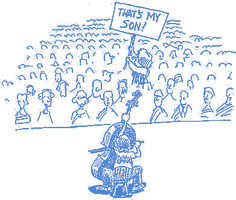


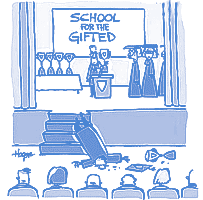

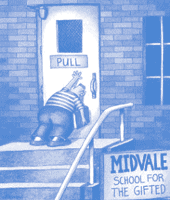
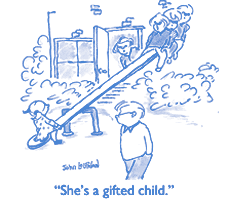
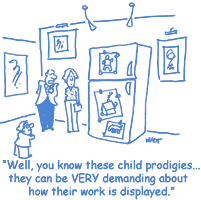


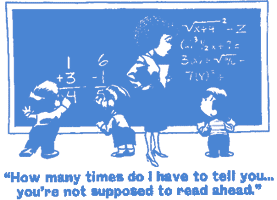
 Prodigy
passion.
Prodigy
passion. Mindsets for
gifts.
Mindsets for
gifts. The dark side
of gifts.
The dark side
of gifts. The bright side
of gifts.
The bright side
of gifts. Free will.
Nothing is fated.
Free will.
Nothing is fated.
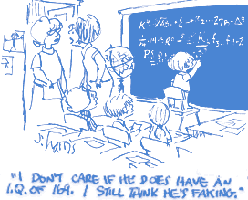
 The fourth
force.
The fourth
force.
 Being identified as being gifted.
Being identified as being gifted.
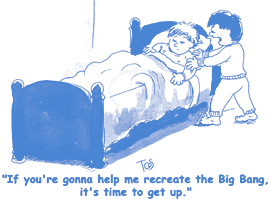
 The gifted
as a wasted resource.
The gifted
as a wasted resource.